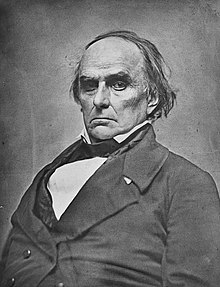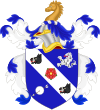Daniel Webster | |
|---|---|
 Daguerreotype of Webster, c. 1847 | |
| 14th and 19th United States Secretary of State | |
| In office July 23, 1850 – October 24, 1852 | |
| President | Millard Fillmore |
| Preceded by | John M. Clayton |
| Succeeded by | Charles Magill Conrad |
| In office March 6, 1841 – May 8, 1843 | |
| President | |
| Preceded by | John Forsyth |
| Succeeded by | Abel P. Upshur |
| Chair of the Senate Finance Committee | |
| In office December 2, 1833 – December 5, 1836[1] | |
| Preceded by | John Forsyth |
| Succeeded by | Silas Wright |
| United States Senator from Massachusetts | |
| In office March 4, 1845 – July 22, 1850 | |
| Preceded by | Rufus Choate |
| Succeeded by | Robert Charles Winthrop |
| In office June 8, 1827 – February 22, 1841 | |
| Preceded by | Elijah H. Mills |
| Succeeded by | Rufus Choate |
| Chair of the House Judiciary Committee | |
| In office 1823–1827 | |
| Preceded by | Hugh Nelson |
| Succeeded by | Philip P. Barbour |
| Member of the U.S. House of Representatives | |
| In office March 4, 1823 – May 30, 1827 | |
| Preceded by | Benjamin Gorham |
| Succeeded by | Benjamin Gorham |
| Constituency | Massachusetts's 1st district |
| In office March 4, 1813 – March 3, 1817 | |
| Preceded by | George Sullivan |
| Succeeded by | Arthur Livermore |
| Constituency | New Hampshire's at-large district |
| Personal details | |
| Born | January 18, 1782 Salisbury, New Hampshire, U.S. |
| Died | October 24, 1852 (aged 70) Marshfield, Massachusetts, U.S. |
| Political party | Whig |
| Other political affiliations |
|
| Spouses | |
| Children | 5, including Fletcher |
| Education | |
| Signature | |
 Coat of arms | |
Daniel Webster (January 18, 1782 – October 24, 1852) was an American lawyer and statesman who represented New Hampshire and Massachusetts in the U.S. Congress and served as the 14th and 19th U.S. secretary of state under presidents William Henry Harrison, John Tyler, and Millard Fillmore. Webster was one of the most prominent American lawyers of the 19th century, arguing over 200 cases before the United States Supreme Court in his career. During his life, Webster had been a member of the Federalist Party, the National Republican Party, and the Whig Party. He was among the three members of the Great Triumvirate along with Henry Clay and John C. Calhoun.
Born in Salisbury, New Hampshire, in 1782, Webster established a successful legal practice in Portsmouth, New Hampshire, after graduating from Dartmouth College and serving a legal apprenticeship. A prominent opponent of the War of 1812, he won election to the United States House of Representatives, where he served as a leader of the Federalist Party. Webster left office after two terms and moved to Boston, Massachusetts. He became a leading attorney before the U.S. Supreme Court, winning cases such as Dartmouth College v. Woodward, McCulloch v. Maryland, and Gibbons v. Ogden.
Webster returned to Congress in 1823 and became a key supporter of President John Quincy Adams. He won election to the United States Senate in 1827 and worked with Henry Clay to build the National Republican Party in support of Adams. After Andrew Jackson defeated Adams in the 1828 U.S. presidential election, Webster became a leading opponent of Jackson's domestic policies. He strongly objected to the theory of nullification espoused by John C. Calhoun. His 1830 Second Reply to Hayne speech is widely regarded as one of the greatest speeches ever delivered in Congress.
Webster supported Jackson's defiant response to the Nullification Crisis but broke with the president due to disagreements over the Second Bank of the United States. Webster joined with other Jackson opponents in forming the Whig Party, and unsuccessfully ran in the 1836 U.S. presidential election. He supported Harrison in the 1840 U.S. presidential election and was appointed secretary of state after Harrison took office. Unlike the other members of Harrison's Cabinet, he continued to serve under President Tyler after Tyler broke with congressional Whigs. As secretary of state, Webster negotiated the Webster–Ashburton Treaty, which settled border disputes with Britain. In 1837, Webster was elected as a member to the American Philosophical Society.[2]
Webster returned to the Senate in 1845 and resumed his status as a leading congressional Whig. During the Mexican–American War, he emerged as a leader of the "Cotton Whigs", a faction of Northern Whigs that emphasized good relations with the South over anti-slavery policies. In 1850, President Fillmore appointed Webster as secretary of state, and Webster contributed to the passage of the Compromise of 1850, which settled several territorial issues and enacted a new fugitive slave law. The Compromise proved unpopular in much of the North and undermined Webster's standing in his home state. Webster sought the Whig presidential nomination in the 1852 U.S. presidential election, but a split between supporters of Fillmore and Webster led to the nomination of Major General Winfield Scott. Webster is widely regarded as an important and talented attorney, orator, and politician, but historians and observers have offered mixed opinions on his moral qualities and ability as a national leader.
- ^ "Membership of the Finance Committee (By Congress and Session)" (PDF). United States Senate Committee on Finance. Retrieved May 2, 2016.
- ^ "APS Member History". American Philosophical Society. Retrieved August 24, 2022.